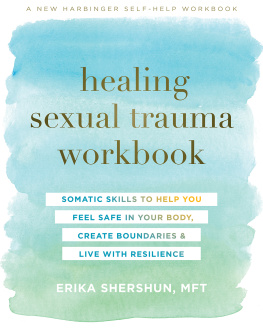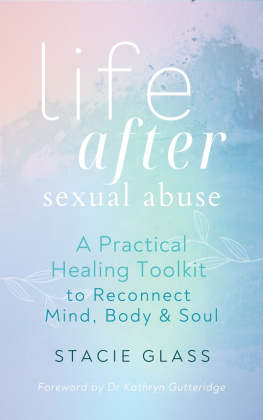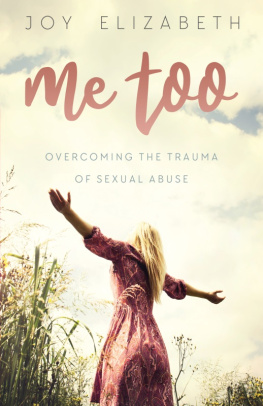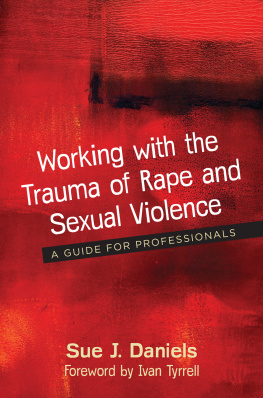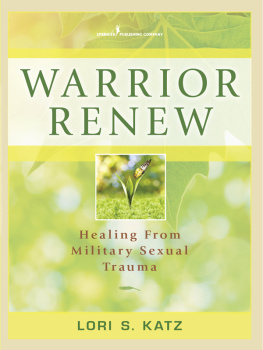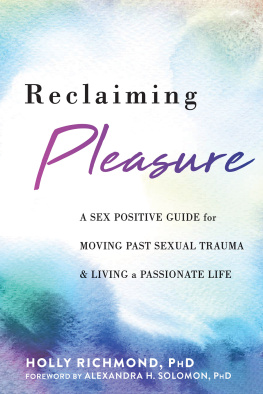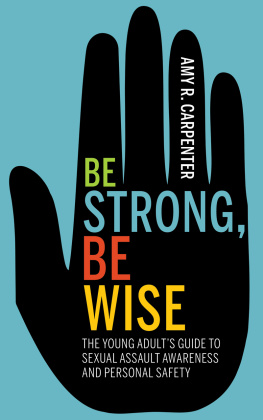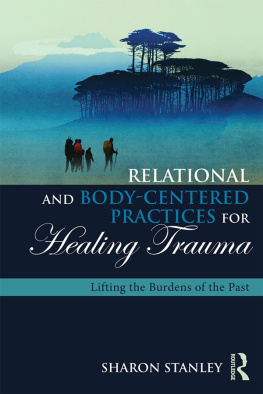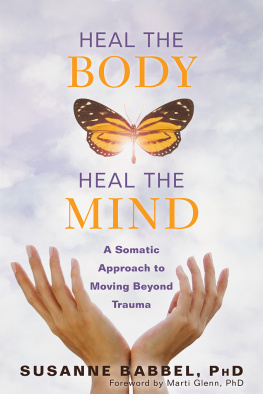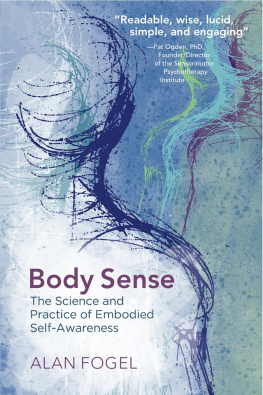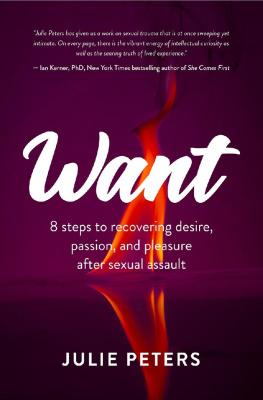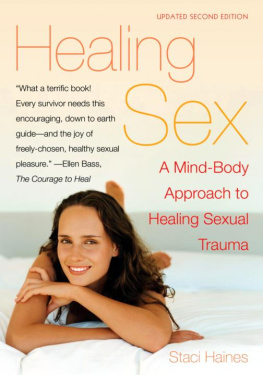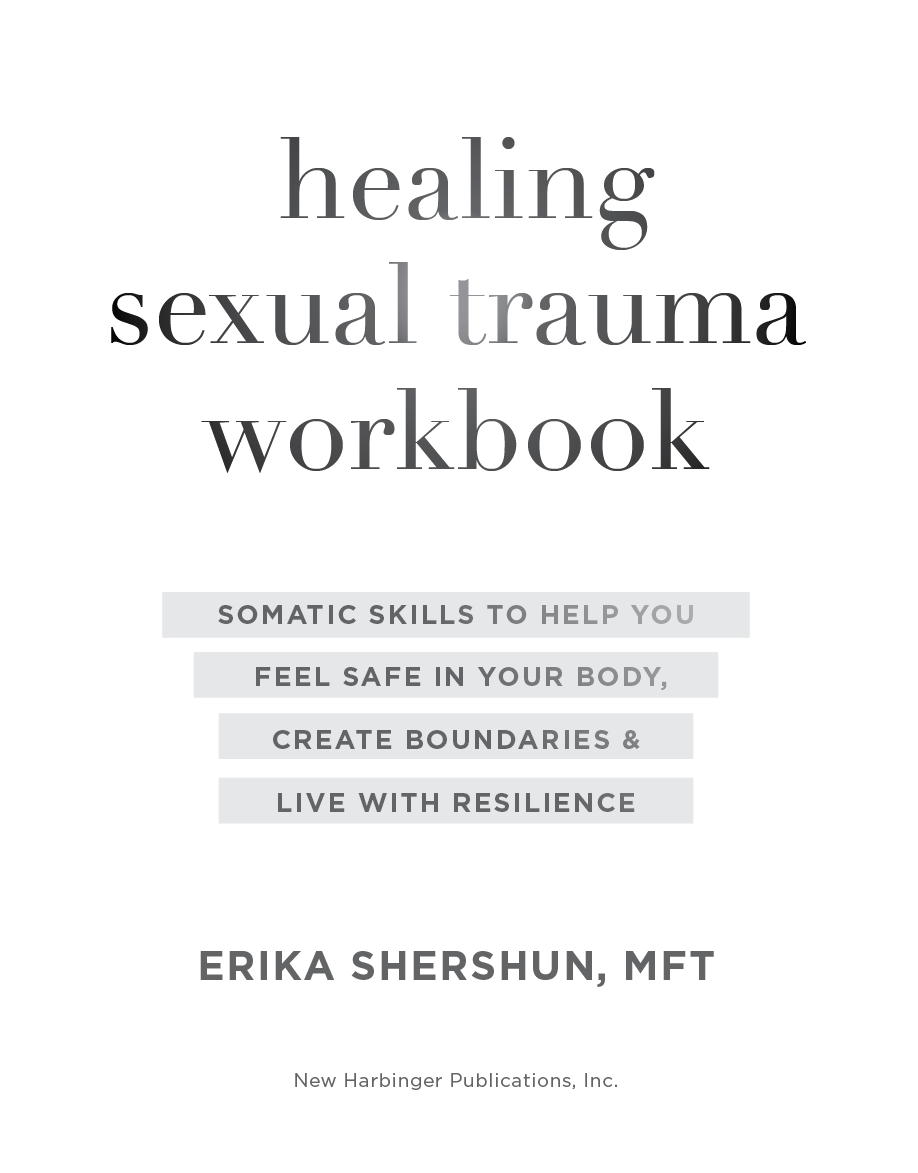In this vital and beautiful workbook, Erika Shershun guides us through the process of understanding our sexual trauma, and ultimately working toward a place of thriving. What really emerges for me from these exercises is that she is equipping survivors with the tools and processes that embolden us to move beyond surviving to flourishing. Erika is inviting survivors on a powerful journey of transformationand Im grateful to her for entrusting survivors to be the drivers of that process.
JoEllen Chernow , cofounder and codirector of Survivors Know
Erika Shershun has written a much-needed, empowering resource for sexual assault survivors. Her Healing Sexual Trauma Workbook explains how trauma impacts the body, mind, and soul. It provides a comprehensive array of worksheets, body-based exercises, and support tools for recovery. It addresses concerns common to survivors that are often overlooked in treatment. And it compassionately offers the guidance, hope, and support that all survivors of sexual assault need and deserve.
Susanne Babbel, PhD, MFT , author of Heal the Body, Heal the Mind; and blogger for www.psychologytoday.com
Erika Shershun has managed to create an invaluable handbook for the many courageous survivors of sexual trauma who are working hard to find their way back to a life of normalcy. What is particularly notable about this, among so many others, is that Shershun knows the territory directly, having found a way to access her own considerable gifts of healing both herself and others. She provides a clear path toward finding ones way.
Don Hanlon Johnson, PhD , professor of somatics in the School of Consciousness and Transformation at the California Institute of Integral Studies (CIIS); and author and editor of several books, including Bone, Breath, and Gesture and Body, Spirit, and Democracy
This workbook is a must for anyone struggling with unhealed trauma. Erika gives tangible tips to safely move through trauma in an empowering and validating way. Learning to listen to your body and emotions is scary and hard, but Erikas workbook makes this practice gentle, which is so needed. So many trauma survivors will be able to reclaim a part of themselves after finishing this .
Stevie Croisant , founder of We Are HER
I highly recommend this compassionate and gentle book to both clients and practitioners as a tool for healing sexual abuse using somatic practices. This step-by-step guide is an excellent source of information to help survivors better understand their bodys reactions. In addition, it offers valuable instructions on everything from grounding to tapping exercises, and from practicing self-compassion to how to handle triggers and flashbacks.
Beverly Engel , licensed therapist, and author of Escaping Emotional Abuse and It Wasnt Your Fault
Dedicated to you, along with the many survivors
Ive had the honor to work with and learn from.
Publishers Note
This publication is designed to provide accurate and authoritative information in regard to the subject matter covered. It is sold with the understanding that the publisher is not engaged in rendering psychological, financial, legal, or other professional services. If expert assistance or counseling is needed, the services of a competent professional should be sought.
Distributed in Canada by Raincoast Books
Copyright 2021 by Erika Shershun
New Harbinger Publications, Inc.
5674 Shattuck Avenue
Oakland, CA 94609
www.newharbinger.com
Cover design by Amy Shoup
Illustrations by Calvin Lai
Acquired by Jess OBrien
Edited by Gretel Hakanson
All Rights Reserved
Library of Congress Cataloging-in-Publication Data
Names: Shershun, Erika, author.
Title: Healing sexual trauma workbook : somatic skills to help you feel safe in your body, create boundaries, and live with resilience / Erika Shershun.
Description: Oakland, CA : New Harbinger Publications, [2021] | Includes bibliographical references.
Identifiers: LCCN 2020057925 | ISBN 9781684036509 (trade paperback)
Subjects: LCSH: Sexual abuse victims--Rehabilitation. | Sexual abuse victims--Psychology. | Psychic trauma--Treatment.
Classification: LCC RC560.S44 S544 2021 | DDC 616.85/83690651--dc23
LC record available at https://lccn.loc.gov/2020057925
Contents
Introduction
It takes courage and perseverance to heal from sexual assault. It is that very courage and perseverance thats led you to this book. My long struggle to heal from sexual trauma drew me to a career as a licensed marriage and family therapist who specializes in working somatically with survivors. The word somatic means relating to the body, and somatic therapy draws on feelings, thoughts, and bodily sensations. Ive written this book because it breaks my heart to see survivors struggling, as I did, to find the necessary tools to heal. Ive compiled the practices Ive found most effective in my work to share with you so you too dont lose precious time searching.
Many of the exercises in this book ask you to bring attention to your body and what sensations are present. You might be wondering, Why my body when my thoughts originate in my brain? given the brain is commonly regarded as the center of thought. We work with the body and its sensations, as well as feelings and thoughts, because your brain is interconnected with your entire body through the peripheral nervous system and signals from your bodys physiological processes. Your brain isnt an isolated organ in your head; its interconnected with your heart-brain, your gut-brain, and your nervous system, all interwoven with the physiology and movements of your entire body (Siegel 2012).
I know firsthand that talk therapy alone will not alleviate all the symptoms of trauma. Its necessary to address whats happening in your body as youre making meaning not only with thoughts but also with bodily sensations; one influences the other. Since your experiences are interwoven with one aspect influencing another, together affecting the whole, you cant simply think or will away the intrusive symptoms of trauma. The whole system must be included in healing. The body-mind is where transformation takes place.
Author and bodyworker Deane Juhan (2003) summed up this interconnectedness beautifully, The skin is no more separated from the brain than the surface of a lake is separate from its depths; the two are different locations in a continuous medium.... The brain is a single functional unit, from cortex to fingertips to toes. To touch the surface is to stir the depths (43).
Healing from sexual assault is a journey that takes time. There will be twists and turns along the way. You may have a breakthrough, followed by a time of reprieve; then a new discovery, detail, or memory will surface. This can feel devastating, like a big setback, and when your nervous system is in a depressed state, you may lose hope of ever healing from sexual trauma. But the journeys not linear; its not about crossing a finish line. Each time you encounter what feels like a setback, another piece of the trauma is stepping into the light of day to be healed. Its your preceding success, however small, that allowed for this new challenge to be faced. Its like peeling off layers of an artichoke, eventually youll come to the most wonderful center, the undefended heart.
Im grateful to the #MeToo movement for shining a light on this long-hidden underbelly of humanity. Illuminating this dark truth has helped many find the courage to give voice to the unspeakable, and ultimately seek support to heal. Although we have a long way to go, weve traveled so far from when I was first assaulted. Back then, we had never heard the terms acquaintance rape or date rape; internalized shame kept us in isolation believing self-defeating thoughts like, This is proof of my unworthiness, or I must be to blame. There was no chorus of others voices to help normalize our traumas. I cringe as I write the word normalize; theres nothing normal about these violations, yet the frequency with which they occur leaves a wake of violated and traumatized souls in their pathssouls that need to know theyre not alone, that their symptoms are not evidence of a sickness within, but rather a sign of a disease throughout our culture. You are not alone.

